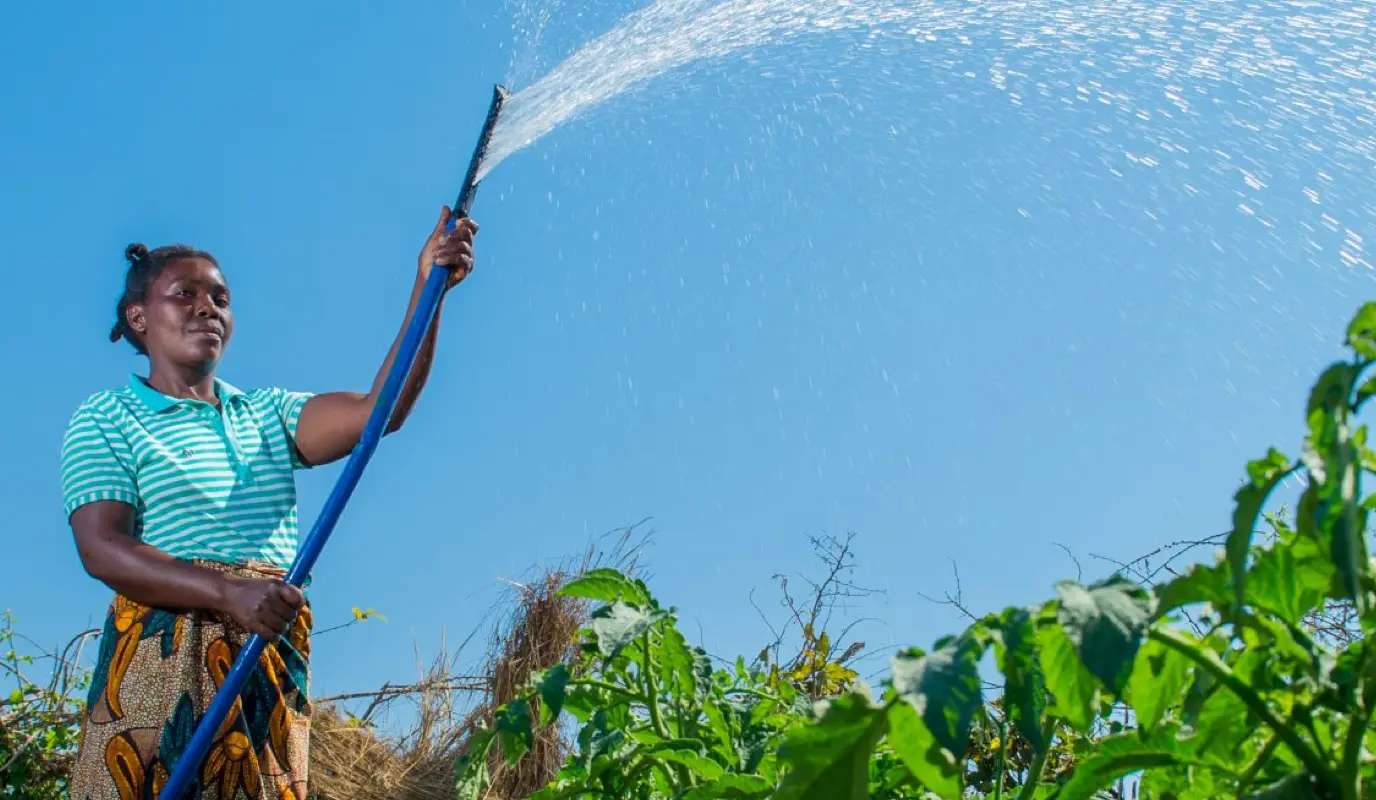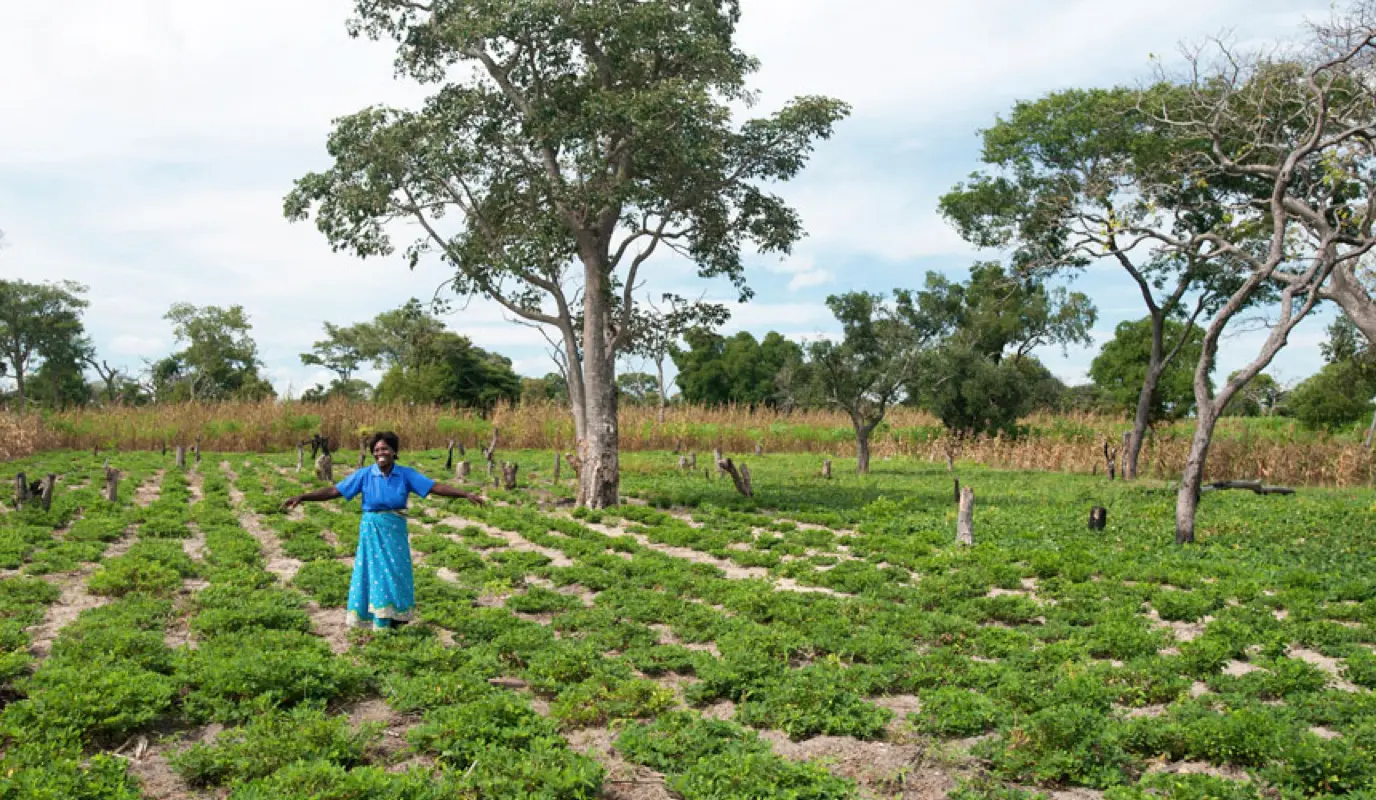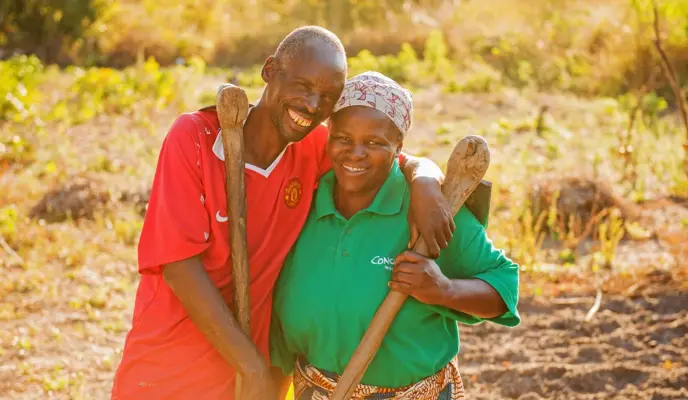Realigning Agriculture to Improve Nutrition
An award-winning solution to the multi-sectoral causes of chronic malnutrition in children.
PLEASE NOTE: THIS ARTICLE WAS FIRST PUBLISHED IN 2015 AND LAST UPDATED IN 2021
The Challenge
The first 1,000 days between pregnancy and a child’s second birthday are critical to the lifelong health of both mother and child. During this period, the nutrients a mother absorbs are passed along to her child, and set the standard for how that child will grow and develop in the years that follow. Fewer nutrients during pregnancy, and especially in the first two years of life, can lead to stunted growth for children, and a lifetime of hindered growth and fewer opportunities.
At the start of the last decade, nearly 45% of children (under the age of 5) in Zambia suffered from stunting, a condition of low height for a given age, indicating chronic malnutrition. In the Mumbwa District of central Zambia, where there was a shortage of nutritious food and access to comprehensive health care, that rate was, in 2011, 59%.
An Integrated Approach
Agriculture is an important piece of the puzzle here: Nearly 10% of Zambia’s population are smallholder farmers who largely depend on rainfall for a successful harvest. Many live in the Mumbwa District, which has historically been known as farming country. However, many of the smallholder farmers here have also become more vulnerable in the face of climate change and less dependable weather patterns. Many of these small family farms also lack basic assets that could strengthen their success, including quality seeds, post-harvest storage, and affordable financial services.
For many farming families in Mumbwa, these poor harvests or crop losses have a double impact: Less to eat at mealtime, and less to sell at market. Recognizing the link between nutrition and agriculture, and the challenges of farming in the face of a climate crisis, we began to develop a program that would respond to these variables. Part of the program also focused on strengthening the connections between sectors like nutrition and agriculture to allow for more successful and collaborative work in the future.
Realigning Agriculture to Improve Nutrition
With funding from Irish Aid and Kerry Group Ireland, Concern launched Realigning Agriculture to Improve Nutrition (RAIN) in August 2011. The main goal of the project:
Could we improve child nutrition by addressing the multi-sectoral causes of malnutrition?
To test this theory, Concern Zambia partnered with the International Food Policy Research Institute (IFPRI). Concern managed the project, while IFPRI led on the research component. We also worked with local ministries including the Ministry of Agriculture and Livestock, the Ministry of Health, and local NGO the Mumbwa Child Development Agency (MCDA).

Working with three groups (including one control group), we tested two models:
- Work with farming families on agricultural interventions that could increase year-round availability of (and access to) nutrient-rich food
- Implement the same agricultural interventions, but also add a dedicated promotion of best health and nutrition practices within families
Centering Women At the Heart of the Project
Gender equality is the third key factor in improving agriculture practices to, in turn, improve child nutrition. With our overarching goal here being getting more kids “through to two” — that is, keeping them healthy in the 1,000-day window between pregnancy and their second birthday — it was essential to keep women at the center of RAIN.
Supported by complementary activities and programs at the district and national levels, we established local women’s groups for mothers and their young children. The women in these groups received both agriculture and nutrition training sessions on a biweekly basis, led by community experts in smallholder farming and community health volunteers, assisted by partners from Concern, MCDA, and the government. Our mentors also made home visits to participating families for checkups and valuable one-on-one time for questions around the new Climate Smart Agriculture techniques being learned.
To ensure that the families participating in RAIN had the best chance for success, Concern provided farming supplies for half of the four-year project. This included high-quality seeds based on their nutritional value, including staples like legumes, vegetables, and fruits.

Stronger Together
The group dynamics created a whole greater than the sum of its parts for families in Mumbwa District. Not only did it allow for groups of women to receive the same training at the same time, but it also strengthened a sense of gender equity in the communities where we worked, which is critical for success across the board in ending poverty. When women have equal voice at home, this influences the priorities for household finances and savings and allows the unpaid labor of raising a family and keeping a home to be more evenly distributed between men and women. This doesn’t happen naturally, and a system of support allowed women to share their challenges, successes, advice, and questions with one another.
This support system carried through in other areas of focus for RAIN, including the behavioral changes that needed to happen in both farming and child-rearing for the malnutrition rates to go down. As nutrition rates in Zambia are also affected by the number of women who have HIV/AIDS, we also focused on dismantling the inequities that often leave these women marginalized within their own communities by their own gender.
Planting the Seeds for Future Success
In 2015, after a four-year test run, RAIN concluded and was evaluated against the three test groups (agriculture only, agriculture and nutrition, and control). In that timeframe, the prevalence of stunting in Mumbwa decreased significantly, from 44.8% to 28.5%, across all three groups. Part — though not all — of this can be attributed to RAIN. An independent analysis attributes an 8.4% decrease thanks to RAIN in agriculture-nutrition program families and a 6.3% decrease in agriculture-only families. Part of this was attributed to some families not participating for the full duration of the program, and for the program itself being relatively short. While four years may seem like a long time, it often takes much longer to test, refine, and adapt large-scale programs to affect real change.

What we did see, however, were tremendous gains in terms of nutrient-rich foods being produced by the families who participated in RAIN compared to our control group, including the amount of food as well as the amount of nutrients such as A vitamins.
We also saw significant increases in gender equality with the families who participated in RAIN, including gains in buying power for women, social capital, and decision-making power. The sessions aimed at promoting gender equality led to a clear shift in women’s involvement in running family farms, either jointly with their spouses or solo, including areas like choosing crops for production and deciding how to spend the money from the sale of crops. As one farmer, Chibala, told Concern in 2014 during a house visit, this training was invaluable for their life together as he now knows how he can help her in running their farm and home. “Working together has made our love deeper.”
Where We've Been Since Then
Ten years ago, multi-sectoral approaches to solving issues like malnutrition were much less common than they are now in 2021. The ability of RAIN to bring different sectors together at the district level also planted the seeds for future success, at Concern and beyond.
One of the benefits of working in Zambia on this project was that it was a relatively more stable environment compared to the fragile contexts of conflict and instability that have become Concern’s niche. This gives us the opportunity to try out more innovative approaches that can then be adapted to more challenging areas. We’ve since applied lessons from RAIN, especially around home gardening and gender equality, to our work in Burundi, Chad, Liberia, and South Sudan.
While RAIN was not ultimately successful in our key goal of bringing down stunting rates through this approach, the benefits of the program were enough for Kerry Group to re-invest in a new model of Realigning Agriculture to Improve Nutrition that we are currently introducing in Niger. In Ethiopia and Kenya, our LEAF Project has also adapted some of the multi-sector principles of RAIN, to key success: Thanks to a combination of agricultural programs and nutrition interventions, the area of Kenya where LEAF took place did not require food aid distributions for the first time in 30 years.
Oh, and in Zambia, the average stunting rates have now gone down to 35%. There’s still more work to be done, but it’s moving in the right direction. We’ll continue to find the solutions that keep it that way.
Your Support
Your tax-deductible gift makes you part of a vital community that enables us to reach 9 million people each year with lifesaving nutrition solutions. Your tax-deductible gift makes you part of a vital community that enables us to reach nearly 10 million people each year with lifesaving health and nutrition solutions, including ongoing work to get children Through to Two.
